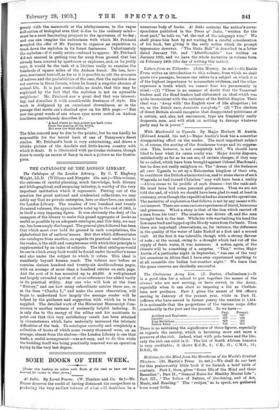THE CATALOGUE OF THE LONDON LIBRARY.
The Catalogue of the London Library. By C. T. Hagberg Wright, LL.D. (Williams and Norgate. 35s. net.)—This volume, the outcome of careful planning, much knowledge, both literary and bibliographical, and unsparing industry, is worthy of the very important institution which it represents. Putting out of the question the great national and academical collections, we may safely say that no private enterprise, here or elsewhere, can match the London Library. The number of two hundred and twenty thousand volumes, the approximate total up to the end of 1901, is in itself a very imposing figure. It was obviously the duty of the managers of the library to make this grand aggregate of books as useful as possible by an adequate catalogue, and this duty, we may say, has been amply discharged. The general plan followed has been that which must ever hold its ground in such compilations, the alphabetical list of authors' names. But that whiCh differentiates one catalogue from another, as regards its practical usefulness to the reader, is the skill and completeness with which this principle is supplemented by an index of subjects. The ideal catalogue would be one in which every book would be found under its author's name and also under the subject to which it refers. This ideal is manifestly beyond human reach. The volume now before us contains sixteen hundred and twenty-six double-column pages, with an average of more than a hundred entries on each page. And the cost of it has mounted up .to £4,250. A well-planned and largely extended system of cross-references has added 'vastly to its practical utility. Any one who will look at the item "History," and see how many subordinate entries there are, or at the item "Charles I.," and make the same observation, will begin to understand how largely the average reader will be helped by the guidance and suggestion with which he is thus supplied. The detailed work of the Historical Manuscript Com- mission is another instance of eminently helpful indexing. It is only due to the energy of the editor and his assistants to point out that this very satisfactory result has been attained in circumstances which have materially increased the intrinsic difficulties of the task. To catalogue correctly and completely a collection of books of which some twenty thousand were, on an average, absent from the shelves—the London Library is one that lends, a useful arrangement—was not easy, and to do this while the building itself was being practically renewed was an operation trying to the very last degree.










































 Previous page
Previous page